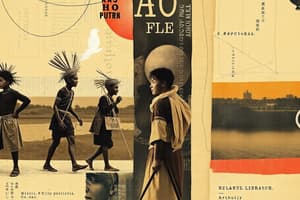Podcast
Questions and Answers
What is political anthropology?
What is political anthropology?
- A study of politics in modern states
- A study of politics within a single cultural context
- A study of politics in pre-modern societies
- A comparative study of politics across various social, cultural, and historical contexts (correct)
Who were some of the early thinkers who traced the evolution of human society from 'primitive' to 'advanced'?
Who were some of the early thinkers who traced the evolution of human society from 'primitive' to 'advanced'?
- Pierre Bourdieu and Benedict Anderson
- Meyer Fortes and E. E. Evans-Pritchard
- Lewis H. Morgan and Sir Henry Maine (correct)
- Max Gluckman and Edmund Leach
What were some of the characteristics of early political anthropology?
What were some of the characteristics of early political anthropology?
- Ethnocentric, speculative, and often racist (correct)
- Conflict-oriented and focused on crosscutting ties
- Scientific, objective, and empirical
- Focused on kinship and lineage
What inspired the modern study of political anthropology?
What inspired the modern study of political anthropology?
What did Meyer Fortes and E. E. Evans-Pritchard argue for in the scientific study of political institutions?
What did Meyer Fortes and E. E. Evans-Pritchard argue for in the scientific study of political institutions?
What did political anthropology focus on in its early stages?
What did political anthropology focus on in its early stages?
What did political anthropology become inherently more of as states and their institutions became the main focus of study?
What did political anthropology become inherently more of as states and their institutions became the main focus of study?
What did political anthropology begin to study as more complex social settings entered ethnographic accounts and analysis of local phenomena?
What did political anthropology begin to study as more complex social settings entered ethnographic accounts and analysis of local phenomena?
Who are some notable political anthropologists?
Who are some notable political anthropologists?
Study Notes
Overview of Political Anthropology
- Political anthropology is a comparative study of politics across various social, cultural, and historical contexts.
- Political anthropology has its roots in the 19th century, with thinkers like Lewis H. Morgan and Sir Henry Maine tracing the evolution of human society from 'primitive' to 'advanced'.
- Early political anthropology was ethnocentric, speculative, and often racist.
- Political anthropology became a modern study inspired by modern science, especially the approaches espoused by Charles Darwin.
- Political anthropology focused on kinship as the key to understanding political organization and emphasized the role of the 'gens' or lineage as an object of study.
- Meyer Fortes and E. E. Evans-Pritchard rejected historical reconstruction and argued for a scientific study of political institutions focused on taxonomy by comparing societies in order to make generalizations about them.
- Political anthropology developed a conflict-oriented approach, which maintained the stability of political systems through crosscutting ties among social actors.
- Anthropologists began to study more complex social settings in which the presence of states, bureaucracies, and markets entered both ethnographic accounts and analysis of local phenomena.
- Anthropology became inherently more political as states and their institutions became the main focus of study.
- Political anthropology also focused on ethnicity and nationalism and the construction of cultural/political identity.
- There is now an anthropology of policy making, development anthropology, and an anthropology of borders.
- Notable political anthropologists include Max Gluckman, Edmund Leach, Pierre Bourdieu, Benedict Anderson, and James C. Scott.
Studying That Suits You
Use AI to generate personalized quizzes and flashcards to suit your learning preferences.
Description
Test your knowledge on the fascinating field of Political Anthropology! From its roots in the 19th century to its modern-day focus on ethnicity, nationalism, and policy-making, this quiz will cover the evolution and development of political anthropology as a comparative study of politics across various social, cultural, and historical contexts. Discover the key thinkers and their contributions, and see how much you know about this interdisciplinary field.




